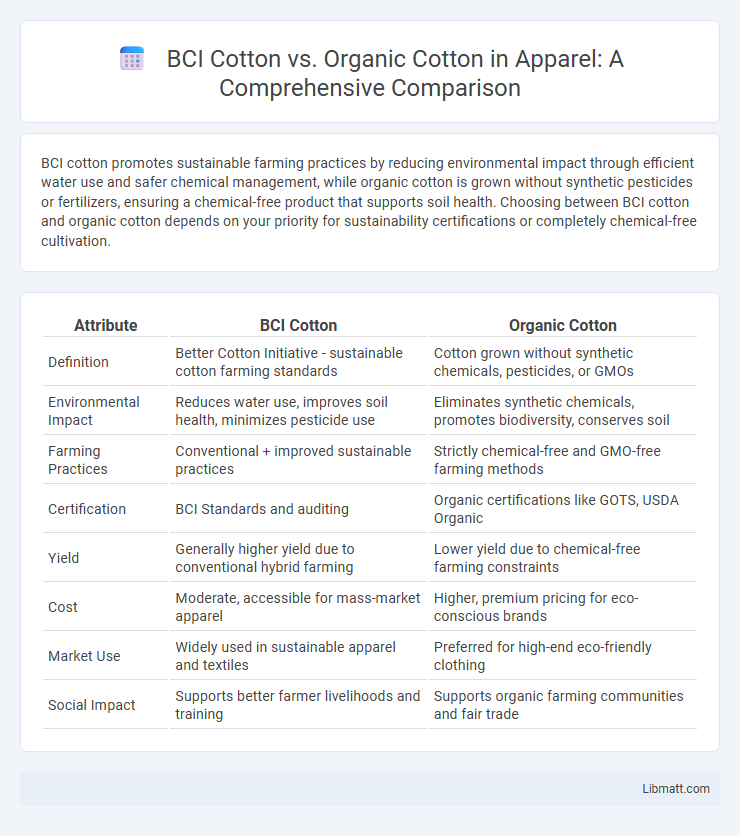BCI cotton promotes sustainable farming practices by reducing environmental impact through efficient water use and safer chemical management, while organic cotton is grown without synthetic pesticides or fertilizers, ensuring a chemical-free product that supports soil health. Choosing between BCI cotton and organic cotton depends on your priority for sustainability certifications or completely chemical-free cultivation.
Table of Comparison
| Attribute | BCI Cotton | Organic Cotton |
|---|---|---|
| Definition | Better Cotton Initiative - sustainable cotton farming standards | Cotton grown without synthetic chemicals, pesticides, or GMOs |
| Environmental Impact | Reduces water use, improves soil health, minimizes pesticide use | Eliminates synthetic chemicals, promotes biodiversity, conserves soil |
| Farming Practices | Conventional + improved sustainable practices | Strictly chemical-free and GMO-free farming methods |
| Certification | BCI Standards and auditing | Organic certifications like GOTS, USDA Organic |
| Yield | Generally higher yield due to conventional hybrid farming | Lower yield due to chemical-free farming constraints |
| Cost | Moderate, accessible for mass-market apparel | Higher, premium pricing for eco-conscious brands |
| Market Use | Widely used in sustainable apparel and textiles | Preferred for high-end eco-friendly clothing |
| Social Impact | Supports better farmer livelihoods and training | Supports organic farming communities and fair trade |
Introduction to BCI and Organic Cotton
BCI (Better Cotton Initiative) cotton promotes more sustainable cotton farming practices by reducing environmental impact and improving livelihoods through water conservation and pesticide reduction. Organic cotton is grown without synthetic fertilizers or pesticides, emphasizing soil health and biodiversity to minimize chemical usage and environmental harm. Both aim to enhance cotton sustainability but differ in certification standards and farming methods.
What is BCI Cotton?
BCI Cotton, or Better Cotton Initiative Cotton, is cultivated under a global sustainability program aimed at improving cotton farming practices through environmental, social, and economic criteria. Unlike organic cotton, which is grown without synthetic chemicals and requires strict organic certification, BCI Cotton focuses on reducing harmful pesticide use, promoting water efficiency, and improving farmers' livelihoods. Your choice of BCI Cotton supports responsible farming with a focus on scalability and better environmental management, balancing sustainability with market demands.
What is Organic Cotton?
Organic cotton is cultivated without synthetic pesticides, fertilizers, or genetically modified organisms, promoting sustainable farming practices that protect soil health and biodiversity. It undergoes strict certification processes, such as GOTS (Global Organic Textile Standard), ensuring environmental and social responsibility throughout production. Compared to BCI cotton, which focuses on improving conventional cotton farming, organic cotton emphasizes chemical-free growth and holistic ecosystem balance.
Environmental Impact: BCI vs Organic Cotton
BCI cotton, produced under the Better Cotton Initiative, promotes sustainable farming practices that reduce water usage and pesticide application but may still involve some conventional methods impacting soil health. Organic cotton is grown without synthetic chemicals or GMOs, enhancing biodiversity and maintaining healthier ecosystems through natural farming techniques. Choosing organic cotton can significantly lower your environmental footprint by supporting regenerative agriculture and minimizing harmful chemical runoff.
Farming Practices Compared
BCI cotton farming emphasizes sustainable agricultural practices such as efficient water usage, reduced pesticide application, and improved soil health to enhance productivity without fully eliminating chemical inputs. Organic cotton farming strictly avoids synthetic pesticides and fertilizers, relying instead on natural methods like crop rotation and composting to maintain soil fertility and biodiversity. Your choice between BCI and organic cotton depends on balancing higher yields with moderate sustainability versus fully chemical-free cultivation preserving ecological integrity.
Certification and Standards
BCI cotton is certified by the Better Cotton Initiative, which sets sustainability standards focused on reducing environmental impact and improving farming practices, but it does not require full organic certification. Organic cotton must meet strict certifications such as GOTS (Global Organic Textile Standard) or USDA Organic, ensuring no synthetic pesticides or fertilizers are used and promoting biodiversity. These certifications guarantee higher standards for soil health, water usage, and chemical restrictions compared to BCI, positioning organic cotton as a more rigorously verified eco-friendly choice.
Social and Economic Factors
BCI cotton supports farmers with training and better agricultural practices, leading to increased yields and improved livelihoods compared to conventional cotton farming. Organic cotton often demands higher labor input and certification costs, which can limit access for smallholder farmers but may attract premium prices benefiting certain communities. Both models contribute differently to rural economies, with BCI focusing on scalability and inclusivity, while organic emphasizes environmental sustainability and niche market development.
Fabric Quality and Consumer Experience
BCI cotton emphasizes sustainable farming practices that improve soil health and reduce water usage, resulting in fabric with consistent strength and durability. Organic cotton is cultivated without synthetic pesticides or fertilizers, offering a softer, chemical-free fabric that is gentle on sensitive skin. Your choice between BCI and organic cotton impacts not only environmental sustainability but also the comfort and longevity of the fabric in your wardrobe.
Sustainability: Pros and Cons
BCI cotton promotes sustainable farming by improving water efficiency and reducing pesticide use, but it still allows conventional chemical inputs. Organic cotton eliminates synthetic chemicals and GMOs, enhancing soil health and biodiversity, yet it often requires higher water usage and yields lower output. While BCI cotton supports broader adoption with moderate environmental impact, organic cotton provides stricter sustainability standards at the cost of scalability.
Which Cotton Should You Choose?
BCI cotton, produced under the Better Cotton Initiative, emphasizes sustainable farming practices and water efficiency, making it a responsible choice for environmentally-conscious consumers. Organic cotton is grown without synthetic pesticides or fertilizers, ensuring a chemical-free product that supports soil health and biodiversity. Choosing between BCI cotton and organic cotton depends on your priority for sustainability certification and environmental impact, with organic cotton offering stricter ecological standards and BCI cotton promoting broader sustainable agriculture improvements.
BCI cotton vs organic cotton Infographic

 libmatt.com
libmatt.com